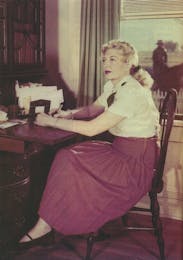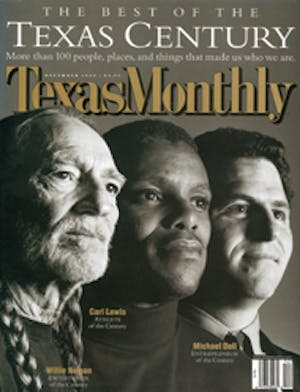EVERY MORNING AT FIVE, she pours herself a cup of black coffee and heads upstairs to the little studio in her Mexia home. Though she is one of the leading country and pop songwriters of this century, she has not had a new song recorded by a major artist in many years. Still, she continues to write every day. For Cindy Walker, songwriting is its own reward.

Slowly, other rewards have been coming her way: induction into the Country Music Hall of Fame in Nashville in 1997, for instance, and into the National Cowgirl Museum and Hall of Fame in Fort Worth the following year. But unless you’re the type that reads the fine print on record labels, you’ve probably never heard of her. If you are that type, you know that during half a century or so when songwriting was even more of a man’s game than it is now, Walker wrote, first and foremost, “You Don’t Know Me,” a number ten country hit for Eddy Arnold in 1956 and a number two pop hit for Ray Charles in 1962. She wrote more than fifty songs for Bob Wills, including “Cherokee Maiden,” “Dusty Skies,” and “Bubbles in My Beer”; nearly two dozen for Ernest Tubb, including “Two Glasses Joe” and “Warm Red Wine”; and had nearly as many recorded by Jim Reeves, Tex Ritter, Hank Snow, and George Beverly Shea. She also wrote “Blue Canadian Rockies” for Gene Autry, “Dream Baby” for Roy Orbison, “China Doll” for the Ames Brothers, and “Barstool Cowboy From Old Barstow” for Spike Jones. Her unabashedly romantic, sentimental, Western-flavored songs have been done by Bette Midler and Grandpa Jones, Elvis and the Byrds, Cher and Willie Nelson (who is rumored to be planning an entire album of Walker tunes). Until this past decade, it was easier to count the number of country stars who hadn’t recorded Walker songs than the number who had.
Yet she has always shunned the limelight, doling out interviews sparingly. It took me about five years of off-and-on requests to get one. She agreed to talk to me with one condition: “You cannot tell my age,” she said, “because if people think you’re older, they think you can’t write contemporary anymore.”
On the morning we were supposed to meet, the red ribbon was tied as promised around the mailbox in front of her house, which is hidden by trees and sits a couple blocks off U.S. 84 in Mexia. Her housekeeper, Willie Mae Adkinson, answered the door and led me back to the combination sitting room—dining room, where Walker and her cousin Bill Hearne, who is her driver and escort on her rare public appearances, were waiting. While Willie Mae fixed breakfast, Walker—an effervescent graying strawberry blonde in a yellow pantsuit—pulled a notebook full of materials for me from the neat filing cabinet in the corner. She read a poem she had written for Willie Mae, another for Chet Atkins, and finally, the one that she’d recited as her acceptance speech when she was inducted into the Country Music Hall of Fame, about the dress she wore, a gift from her mother. She showed videos of that ceremony along with her “soundies,” short film clips shown on jukebox-like machines in bars and restaurants in the 1940’s, and she played tapes of new songs. And once breakfast was over, she sat in her favorite easy chair and told her life story, punctuated with a lot of belly laughs and a little crying.
She was born at her grandparents’ farm near Mart, not far from where she lives now, and grew up largely in that area, though the family moved around often because her father, Aubrey Walker, worked as a cotton broker. Her mother, Oree, was the daughter of F. L. Eiland, who wrote such hymns as “Hold to God’s Unchanging Hand.” “I was her play-pretty,” Walker recalls. “She taught me to dance and sing, but she didn’t need to teach me much because it was just sorta natural with me.” She wrote her first song, “Dusty Skies,” after reading newspaper clippings about the Dust Bowl in her grandmother’s scrapbook.
In late 1940, when her father took the family to Los Angeles on business, Walker persuaded Bing Crosby to cut “Lone Star Trail,” her first sale. Later that year, she penned five songs that were recorded by Bob Wills, who then hired her to write for the five movies he was in town to shoot. A few months later, she’d finished 39 songs without a single rejection; after that, every singing cowboy in Hollywood wanted a Cindy Walker tune tailored to him. Walker always gave them what they wanted, from idealized Western landscapes to starry-eyed songs of chaste love to knee-slapping novelties. She also became a performer herself, appearing in two Gene Autry movies. To aid Walker’s career, her father decided to keep the family in Hollywood, even if he was always shuttling in and out of town; she says he taught her to “learn the business end of music and make good deals and read every word of the contract.” Her mother, who’d initially been wary of the move, came to like Hollywood. She threw big parties every year at Christmas for the performers and played the piano on all of her daughter’s demos. “I didn’t have a worry in the world about rent or food,” Walker said. “I was free to write my songs, and that’s what I loved to do.”
She liked it so much that she never married. “I’m old-fashioned,” she explained. “I believe that if you’re married you have to stay with your husband and children, and they take all your time. I give all my time to my songwriting, and that’s the way it is. It’s simple, very simple.” She liked it so much that she essentially ignored her own performing career; she didn’t even write her sole hit, 1944’s “When My Blue Moon Turns to Gold Again,” and her record company was constantly complaining (justifiably) that she gave all her best material to other singers. When she and her mother decided to move back to Texas in 1954—her father had died of a heart attack six years earlier—she quit performing to concentrate on writing.
They moved into the same house she lives in today. Every October, right before the annual deejay convention and Country Music Awards, they’d take a train to Nashville, rent an apartment at the Continental and a piano, and conduct a writers’ salon until April. Stars and unknowns would drop by and tell Walker what kind of song they wanted. If she didn’t already have something along those lines, she would custom-write it to fit their image. “I wrote until the song was pleased with itself and I was too,” she said. “If a song didn’t like its words, I’d work until I got it perfect. You have to give every song a face, like a melody or a hookline, so you remember it—just like I’ll remember you by your face.” But Cindy had to be alone when she got down to work. “I can’t write with anyone around me,” she continued. “If someone’s around, it takes part of the idea away. I wouldn’t even tell Mama about a song until it was finished.”
They made quite a pair—elegant, dignified Oree and giddy, giggly woman-child Cindy—and the artists, who always called Oree “Mama,” just as her daughter did, relished the rare opportunities to stick around and enjoy some of her chicken and dumplings for dinner. If anyone considered it unusual that hit after hit was being written by a woman—practically the only woman, in fact, who wasn’t co-writing with a male partner—nobody said anything. “People ask me this a lot, like it’s some feminist thing, and all I can say is I don’t know. I have no idea why there weren’t other women songwriters,” she said with just a hint of weariness at being asked again. “I never did have trouble with the artists because they wanted the same thing I did; they wanted a hit, that’s how they made their living, and they didn’t care who wrote the songs, whether it was a man, woman, or monkey. Plus I was lucky they loved Mama’s playing—and they loved eating her cooking.”
At the end of one Nashville trip, Eddy Arnold suggested a song title and theme to her. The idea didn’t make a lot of sense to her, but she promised him she’d “let it cook.” One night in her studio several months later, she said, “something started singing to me,” and she wrote the opening stanza of a song that laid hearts on the line: “You give your hand to me/And then you say hello/And I can hardly speak/My heart is beating so/And anyone can tell/You think you know me well/But you don’t know me.” By the time she’d finished this uncharacteristically introspective tale of a man too shy to tell his true feelings to a female friend, Arnold had forgotten all about his initial idea. But he made the song a hit anyhow, and then Ray Charles made it a standard. The list of people who’ve cut “You Don’t Know Me” since goes on and on. So does the list of country stars, from Merle Haggard to Ricky Skaggs, who continued cutting her songs through the seventies and eighties. In all, Walker says, her songs have made the country or pop Top Forty more than four hundred times.
But the Nashville trips stopped after her mother’s death, in 1991. (Walker says she never knew how old Mama was.) Today, she tapes her new songs accompanied by her own piano and then sends them to Cousin Bill, who records demos at his Fort Worth studio with former Texas Playboy Leon Rausch singing lead. Last year, Rausch cut a CD of Walker tunes, including five new ones, for an independent record label; it did well in Europe but hardly sold at all in the U.S.
Walker still mails her demos to Nashville artists, but these days she rarely even gets a reply. She understands that—“I write lyric songs, and they play too loud today for you to hear the lyrics”—and she keeps writing anyway. After all, songwriting is all she knows, and all she’s ever done.






